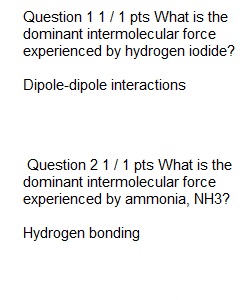


Q Question 1 1 / 1 pts What is the dominant intermolecular force experienced by hydrogen iodide? Question 2 1 / 1 pts What is the dominant intermolecular force experienced by ammonia, NH3? Question 3 1 / 1 pts What is the dominant intermolecular force experienced by silane, SiH4? Question 4 1 / 1 pts What is the dominant intermolecular force experienced by hydrogen fluoride? Question 5 0.5 / 1 pts Methane (CH4) reacts with chlorine gas to form several different compounds: Methyl chloride (CH3Cl) Methylene chloride (CH2Cl2) Chloroform (CHCl3) Carbon tetrachloride (CCl4) Which of these compounds has the HIGHEST vapor pressure and why?
View Related Questions